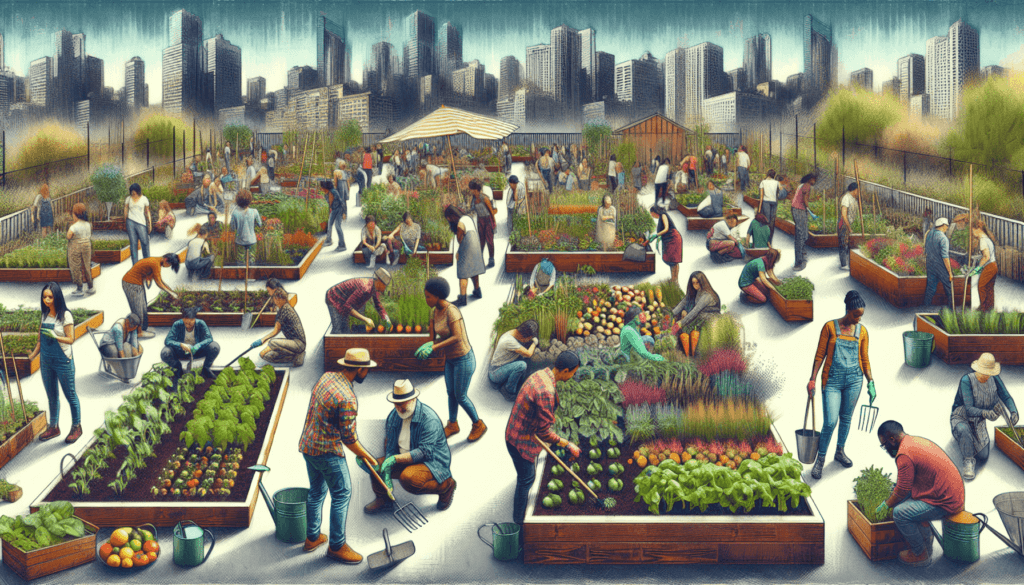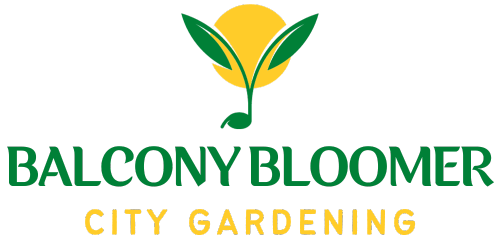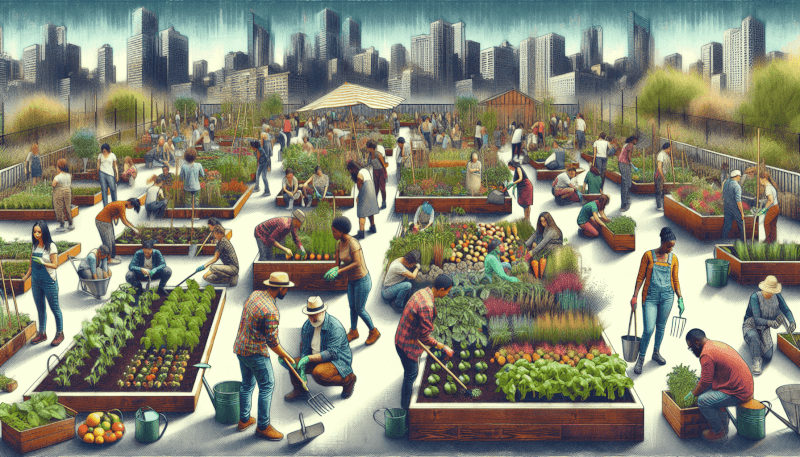Are you tired of living in an area where fresh, affordable produce is hard to come by? Well, there may be a simple yet impactful solution right in your own neighborhood. Urban community gardening is gaining traction as a way to address the issue of food deserts, areas where access to healthy food is limited. By converting unused spaces into vibrant green hubs, these community-led initiatives are not only cultivating delicious fruits and vegetables, but also fostering a sense of unity and empowerment among residents. In this article, we will explore the benefits of urban community gardening and how it can transform food deserts into thriving oases of nourishment.
Defining Food Deserts
Lack of Access to Healthy Food Options
Food deserts are defined as regions or neighborhoods that lack access to affordable and nutritious food options. In these areas, fresh fruits, vegetables, and other healthy foods are often scarce or prohibitively expensive. This limited availability of nutritious foods can have detrimental effects on the health and well-being of individuals living in these communities. Without access to healthy food options, individuals may be more likely to rely on processed and unhealthy foods, leading to a higher risk of obesity, diabetes, and other diet-related diseases.
High Prevalence in Low-Income Urban Areas
Food deserts are most commonly found in low-income urban areas, where residents have limited financial resources to access healthy foods. In these neighborhoods, large chain supermarkets and grocery stores are often few and far between, leaving residents to rely on convenience stores and fast-food chains for their sustenance. These establishments tend to offer processed and unhealthy foods that are often high in sugar, sodium, and unhealthy fats. The lack of access to fresh produce and whole foods in these areas exacerbates existing health disparities, as residents may struggle to maintain a balanced diet and healthy lifestyle.
Effects on Public Health
The presence of food deserts has significant implications for public health. Without easy access to nutritious foods, individuals living in food deserts may experience higher rates of chronic diseases such as obesity, heart disease, and diabetes. Additionally, the lack of affordable and healthy food options can contribute to poor mental health outcomes, including stress, anxiety, and depression. By understanding the impact of food deserts on public health, we can begin to explore solutions that address the root causes and create healthier and more sustainable communities.
Understanding the Importance of Urban Community Gardening
Promoting Food Security
Urban community gardening plays a crucial role in addressing food security. By empowering individuals and communities to grow their own food, urban gardens provide a reliable source of fresh produce in areas where it may be otherwise limited. Through gardening, individuals can take control of their own food production, reducing their dependence on unreliable and distant food supply chains. This increased food security not only ensures a steady and affordable supply of nutritious food but also empowers individuals to make healthier choices and take ownership of their own well-being.
Improving Nutritional Intake
One of the greatest benefits of urban community gardening is the improvement of nutritional intake. By growing their own fruits, vegetables, and herbs, individuals have direct access to fresh and nutrient-rich food options. This allows for a diet that is high in essential vitamins, minerals, and antioxidants, which are vital for overall health and well-being. The presence of community gardens encourages individuals to consume a diverse range of fruits and vegetables, promoting a well-balanced and nutritious diet. By improving nutritional intake, urban community gardening can help combat the negative health effects associated with food deserts.
Creating a Sense of Community
Urban community gardens have the power to bring people together and foster a sense of community. By working and learning alongside fellow gardeners, individuals can form connections and build relationships. Community gardens provide a space for knowledge-sharing, where individuals can exchange gardening tips, techniques, and recipes. These shared experiences not only strengthen community bonds but also create a support network that can help individuals navigate the challenges of gardening and make the most of their urban environments. The sense of community that arises from urban community gardening fosters a stronger social fabric and contributes to overall well-being.

Benefits of Urban Community Gardening in Addressing Food Deserts
Increasing Access to Fresh Produce
Urban community gardening directly addresses the lack of access to fresh produce in food desert neighborhoods. By growing fruits and vegetables within the community, individuals can access affordable, nutritious, and fresh foods right at their doorstep. Additionally, community gardens often distribute surplus produce to residents, ensuring that no harvest goes to waste. This increased access to fresh produce allows individuals to incorporate more nutritious foods into their diets and significantly improves their overall health.
Promoting Healthy Eating Habits
Urban community gardening serves as an effective tool to promote healthy eating habits. By engaging in the process of growing and harvesting their own food, individuals become more connected to the food they consume. This increased connection leads to a greater appreciation for fresh and whole foods, encouraging individuals to make healthier dietary choices. The act of gardening itself also promotes physical activity, further contributing to a healthier lifestyle. Through urban community gardening, individuals develop a real understanding of the value of healthy eating and are more likely to adopt positive dietary habits.
Reducing Health Disparities
Urban community gardening has the potential to reduce health disparities within food desert communities. By providing access to fresh produce and fostering healthy eating habits, community gardens can help level the playing field and improve health outcomes for all residents, regardless of income or access to traditional supermarkets. Additionally, community gardens often prioritize inclusivity and actively involve individuals from diverse backgrounds, creating spaces that are welcoming and accessible to all. This inclusivity ensures that the benefits of community gardening extend to the entire community, working towards a more equitable and just society.
Creating and Sustaining Urban Community Gardens
Identifying Available Spaces for Gardens
The first step in creating urban community gardens is to identify available spaces for cultivation. This can include vacant lots, rooftops, public parks, or even small plots within residential areas. Engaging with local government agencies, community organizations, and landowners can provide insights into potential spaces and help navigate legal and logistical requirements. Additionally, conducting a comprehensive assessment of soil quality, sunlight exposure, and accessibility is essential in selecting suitable locations for community gardens. By carefully considering available spaces, urban community gardens can maximize their productivity and impact.
Building a Supportive Community
The success of urban community gardens relies heavily on the support and involvement of the local community. Engaging and empowering community members to participate in the planning and implementation process is vital. Holding community meetings, workshops, and events can help foster a sense of ownership and ensure that the garden reflects the needs and aspirations of the community. Forming partnerships with local organizations, schools, and businesses can also provide valuable resources, expertise, and volunteer support. By building a strong and supportive community, urban community gardens can thrive and make a lasting impact on food deserts.
Securing Funding and Resources
Securing funding and acquiring necessary resources is an essential step in creating and sustaining urban community gardens. Exploring grant opportunities, fundraising events, and partnerships with local businesses can provide financial support for garden infrastructure, tools, seeds, and educational materials. Collaborating with community members to establish a shared investment in the garden, such as through membership fees or voluntary contributions, can also help ensure ongoing sustainability. By securing funding and resources, community gardens can operate efficiently and provide long-term benefits to residents.

Providing Education and Training
Teaching Gardening Techniques
Providing education and training on gardening techniques is crucial for the success and sustainability of urban community gardens. Offering workshops, classes, or mentorship programs can introduce individuals to the basics of gardening, including soil preparation, plant selection, watering, and pest management. Teaching sustainable gardening practices, such as composting and rainwater harvesting, enables gardeners to minimize their environmental impact. By providing access to gardening knowledge and skills, urban community gardens empower individuals to take an active role in their food production and cultivates a sense of self-sufficiency.
Promoting Nutritional Education
In addition to teaching gardening techniques, urban community gardens can serve as platforms for nutritional education. Workshops and seminars focused on healthy eating habits, meal planning, and food preservation can help community members make informed choices about their diet. Cooking demonstrations using fresh produce from the garden can inspire individuals to try new recipes and explore different cultural cuisines. Additionally, partnering with nutritionists, dieticians, or local health organizations can provide expert guidance and resources to promote a well-rounded understanding of nutrition. By combining gardening knowledge with nutritional education, urban community gardens tackle food deserts on multiple fronts.
Empowering Individuals and Communities
Beyond gardening and nutrition, urban community gardens have the potential to empower individuals and communities. By providing opportunities for leadership roles, skill-building, and personal growth, community gardens foster a sense of empowerment and agency. Enabling community members to take ownership of their food production and engage in decision-making processes cultivates a sense of pride, self-esteem, and resilience. Additionally, community gardens can serve as platforms for social entrepreneurship, allowing individuals to develop marketable skills or create small businesses centered around sustainable agriculture. By empowering individuals and communities, urban community gardens become catalysts for positive societal change.
Involving Local Government and Organizations
Collaborating with Local Authorities
Involving local government authorities is crucial in establishing and sustaining urban community gardens. Engaging in open and transparent communication with relevant government departments, such as parks and recreation, urban planning, or community development, can help gain support and navigate regulatory processes. Seeking partnerships with local authorities can lead to securing land lease agreements, accessing funding opportunities, and receiving support in infrastructure development. By collaborating with local authorities, urban community gardens become recognized as valuable assets to the community, contributing to the overall well-being of residents.
Forming Partnerships with Nonprofit Organizations
Forming partnerships with nonprofit organizations can significantly enhance the impact and reach of urban community gardens. Nonprofits dedicated to food justice, community development, or environmental conservation may offer resources, expertise, and networks that can support the growth and sustainability of community gardens. These organizations can provide funding assistance, volunteer recruitment, capacity-building workshops, and opportunities for collective advocacy. Collaborating with nonprofits also allows community gardens to tap into a broader network of like-minded individuals and initiatives, fostering knowledge exchange and collective action.
Advocating for Policy Changes
Urban community gardens can play an important role in advocating for policy changes that address food deserts and support sustainable food systems. By highlighting the impact of community gardening on public health, environmental sustainability, and local economies, community gardeners can advocate for increased support and recognition from local, regional, and national governments. This can include advocating for funding allocations, implementing zoning ordinances that support community gardens, and integrating urban agriculture into municipal planning frameworks. By actively engaging in policy advocacy, urban community gardens can contribute to systemic changes that address the root causes of food deserts.

Addressing Barriers to Urban Community Gardening
Limited Access to Land
Limited access to land is a significant barrier to establishing urban community gardens. In densely populated urban areas, finding suitable spaces for gardening can be challenging. Addressing this barrier requires creative solutions such as rooftop gardens, vertical gardening systems, or repurposing underutilized spaces. Collaborating with landowners, businesses, and local authorities to secure land leases or temporary use agreements can also provide opportunities for gardening. Additionally, advocating for land redistribution and policy changes that prioritize community gardens can help address the systemic issue of limited access to land.
Lack of Knowledge and Skills
Lack of knowledge and skills in gardening can deter individuals from engaging in urban community gardening. Providing accessible and comprehensive gardening education and training is essential in overcoming this barrier. Engaging experienced gardeners as mentors or developing partnerships with horticultural organizations can provide valuable guidance and support to novice gardeners. Offering hands-on workshops, online resources, and community-led training programs can help build gardening skills and confidence. By addressing the lack of knowledge and skills, urban community gardens can empower individuals to actively participate and contribute to the success of the garden.
Financial Constraints
Financial constraints can pose a significant challenge for urban community gardening initiatives. Developing and maintaining gardens can require significant investments in infrastructure, tools, seeds, and water systems. Overcoming financial barriers requires diversifying funding sources and exploring creative financing models. This can include seeking grants, organizing fundraising events, creating partnerships with local businesses, or implementing shared membership fees or community-supported agriculture (CSA) models. By securing adequate funding and resources, urban community gardens can overcome financial constraints and ensure their long-term sustainability.
Success Stories of Urban Community Gardening Initiatives
Case Study 1: The Detroit Black Community Food Security Network
The Detroit Black Community Food Security Network (DBCFSN) is an exemplary success story of urban community gardening in addressing food deserts. DBCFSN operates D-Town Farm, a seven-acre urban farm, and spearheads various community gardening initiatives across the city. DBCFSN focuses on addressing the historical inequities in the food system and prioritizes the participation and empowerment of Black residents. Through their efforts, DBCFSN has increased access to fresh produce, created local jobs, and fostered community development and self-reliance. Their model serves as an inspiration for other communities looking to address food deserts through urban community gardening.
Case Study 2: The Guerrilla Gardening Movement in London
The guerrilla gardening movement in London is a grassroots initiative that has transformed neglected and abandoned urban spaces into vibrant community gardens. Guerrilla gardening involves reclaiming public or private spaces without permission and transforming them into green spaces for cultivation. This movement has successfully challenged the prevailing perception of urban spaces as solely utilitarian and has created pockets of biodiversity and food production in the city. The guerrilla gardening movement in London has sparked conversations around the importance of community-driven urban agriculture and has inspired individuals and organizations worldwide to take similar action.
Case Study 3: The Philadelphia Urban Food and Fitness Alliance
The Philadelphia Urban Food and Fitness Alliance (PuFFA) is an alliance of organizations dedicated to addressing food deserts and promoting healthy living in Philadelphia. PuFFA has successfully established and maintained community gardens throughout the city, providing access to fresh produce and engaging residents in gardening activities. Additionally, PuFFA focuses on capacity-building and provides education and training on gardening, nutrition, and physical fitness. By targeting multiple dimensions of public health, PuFFA has made significant strides in reducing health disparities and improving the overall well-being of Philadelphia residents.

Challenges and Solutions
Maintaining the Long-Term Sustainability of Gardens
One of the challenges faced by urban community gardens is the long-term sustainability of operations. Ensuring ongoing engagement, maintenance, and resource management can be a daunting task. To address this challenge, community gardens can establish volunteer programs, assign leadership roles, and create maintenance schedules to distribute responsibilities among community members. Engaging youth and providing opportunities for intergenerational learning can also contribute to long-term sustainability. Additionally, developing partnerships with local businesses and organizations can provide ongoing support and resources.
Ensuring Inclusivity and Accessibility
Inclusivity and accessibility are essential considerations for urban community gardens. It is crucial to create spaces that are welcoming and accommodating to individuals of all ages, abilities, and backgrounds. Providing accessible entrances, raised beds, and tools adapted for people with disabilities can ensure that everyone can actively participate in gardening activities. Additionally, translating educational materials, organizing multilingual workshops, and celebrating cultural diversity can foster an inclusive environment. By actively promoting inclusivity and accessibility, urban community gardens can address barriers and ensure that benefits are accessible to entire communities.
Overcoming Seasonal Limitations
Seasonal limitations can pose challenges to the productivity and sustainability of urban community gardens. Cold winters, extreme heat, or limited sunlight can impact plant growth and limit the availability of fresh produce. To overcome these limitations, community gardens can implement season extension strategies such as hoop houses, cold frames, or hydroponic systems. Engaging in crop rotation, selecting suitable plant varieties, and planning ahead can also maximize productivity throughout the year. By adapting to seasonal limitations, urban community gardens can ensure a continuous supply of fresh produce and maintain community engagement year-round.
Conclusion
Addressing food deserts through urban community gardening is a multifaceted and holistic approach that tackles issues of food security, nutrition, public health, and community development. By increasing access to fresh produce, promoting healthy eating habits, and reducing health disparities, community gardens have the potential to transform the lives of individuals living in food desert neighborhoods. Creating and sustaining urban community gardens requires collaboration, education, and advocacy, involving local government, nonprofit organizations, and community members. Despite the challenges, numerous success stories demonstrate the power of urban community gardening in creating healthier, more resilient, and vibrant communities. With continued support and commitment, urban community gardening can be a catalyst for positive change and contribute to a more equitable and sustainable food system.



